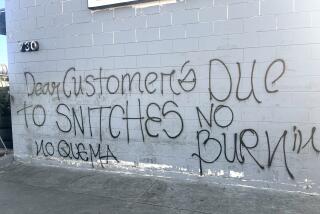License Fight Puts Auto Shop on Skids
- Share via
SANTA MONICA — As the proprietor of a new auto repair shop in Santa Monica, Regina Barrett expected to be up to her elbows in greasy clutches. She did not expect to be entangled in the clutches of the law.
But that’s the predicament in which the Santa Monica resident now finds herself. Barrett has been criminally charged by the Santa Monica city attorney’s office for operating without a business license even though the city has admitted its error in not giving her one in the first place.
On Monday, Barrett’s lawyers will ask a judge to dismiss the charges, over the objections of prosecutors. The city lawyers have insisted that unless Barrett pleads no contest (in which a person offers no defense and is judged guilty) to one misdemeanor count and pays a fine of under $100, the case will go to trial.
If she refuses to plead no contest, prosecutors have also stated in writing that they will pile on more charges, one for each day they allege she operated without a license.
Is this any way to treat the owner of a small business in a recession? Barrett thinks not, and has refused to admit to what is technically criminal behavior.
“I think I’ve been treated badly,” Barrett said before cutting short a telephone interview. She balked at subsequent interview requests and refused to be photographed for this story, saying she feared repercussions from the city if the case attracted publicity.
But her attorney, Christopher M. Harding, was not so reticent. He attacked the prosecution as emblematic of “the prevailing hostile attitude toward business in this city.” By threatening to file a slew of new charges, prosecutors are “attempting to harass (Barrett) into pleading guilty,” he said.
Acting City Atty. Joseph Lawrence said nothing could be further from the truth. He dismissed Harding’s assessment of the case as “a bunch of hokum.”
According to Lawrence, Harding is making an unnecessary fuss over a routine matter in which, if anything, the city helped Barrett out by ultimately granting her a business license. The other option was to require her to go through a more costly, time-consuming process of seeking a conditional-use permit, with no assurance that one would be granted.
“We could have gone the other way quite easily,” Lawrence said. “We have bent over backward for this particular person. . . . We could have laughed at her proof. We did not.”
According to court documents filed on Barrett’s behalf, her saga began in January, 1991, when she signed a lease to open Broadway Auto Services on Broadway, where there had been an auto repair shop for 50 years.
At the time, Barrett, who uses the first name Mona, already owned an auto repair business in Beverly Hills. Barrett spruced up the Santa Monica place for a few months and called the city to inquire about obtaining a business license.
In a sworn statement, Barrett said she was advised by a city staff member that because she would not be fully open for business for several months, a business license was not yet needed.
So, Barrett says, for several months she did most of her repair work at her Beverly Hills shop, but some minor work, including oil changes, at the Santa Monica location.
Meanwhile, she said, she began to solicit business for the new shop, getting 5,000 flyers printed to promote it.
By August, 1991, Barrett said she had generated enough work to make a go of the Santa Monica shop and once again turned her attention to obtaining a business license.
Though she hired a legal clinic to assist her, Barrett said she found out later that an application was not filed for months and later denied.
At the end of February, 1992, she again filed for a license.
She immediately ran afoul of a city guideline that requires certain new businesses (the ones the city wants to regulate or discourage) to obtain conditional-use permits if they are not in operation six months after the previous business has shut down.
Though Barrett’s business was up and running by then, the city would not grant her a license. It wanted her to close the business during the several months it would take to obtain a conditional-use permit.
Barrett said she could not close the business. “This would have been devastating for me financially, probably leading to bankruptcy,” Barrett said in a sworn declaration.
Facing criminal charges, Barrett hired attorney Harding, who threatened to sue the city for refusing to issue a license. Harding ultimately persuaded city officials that they were wrong to insist on a conditional-use permit. Because Broadway Auto Services was partially open for business during the first six-month period, he said, Barrett was entitled to a license.
But because more than a year had lapsed since her first license application, the city insisted that she reapply. Then the city attorneys filed a criminal case for the period in which Barrett operated without a license--even though they had already admitted she had been entitled to one all along.
Lawrence insists it is normal practice to fine someone who has been operating, for any reason, without a business license. “Most people when informed of the law obtain a license and pay a nominal fee,” he said. “She has chosen to have her day in court and we will give her her day in court.”
So far, Barrett is hanging tough. She said she has spent more than $10,000 in legal fees to get what she was always entitled to.
“I am a law-abiding business person. . . . I am not a criminal,” she said in a court statement.
More to Read
Sign up for Essential California
The most important California stories and recommendations in your inbox every morning.
You may occasionally receive promotional content from the Los Angeles Times.













